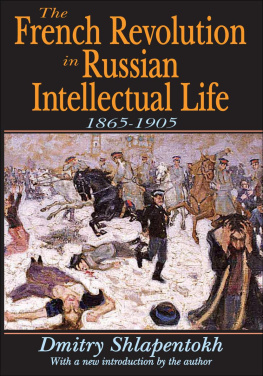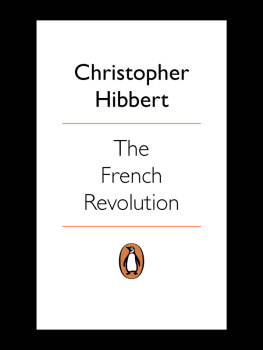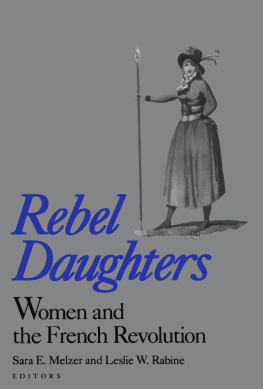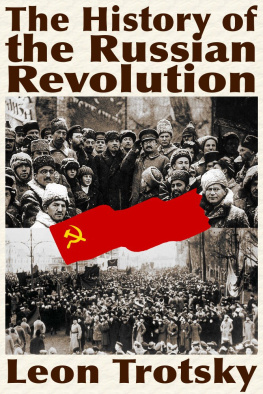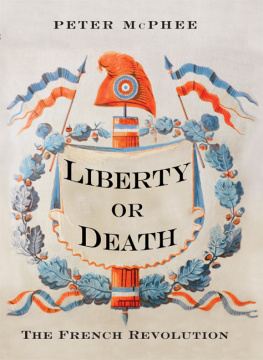Mignet - History of the French Revolution
Here you can read online Mignet - History of the French Revolution full text of the book (entire story) in english for free. Download pdf and epub, get meaning, cover and reviews about this ebook. year: 2012, publisher: Andrews UK Ltd., genre: Romance novel. Description of the work, (preface) as well as reviews are available. Best literature library LitArk.com created for fans of good reading and offers a wide selection of genres:
Romance novel
Science fiction
Adventure
Detective
Science
History
Home and family
Prose
Art
Politics
Computer
Non-fiction
Religion
Business
Children
Humor
Choose a favorite category and find really read worthwhile books. Enjoy immersion in the world of imagination, feel the emotions of the characters or learn something new for yourself, make an fascinating discovery.

- Book:History of the French Revolution
- Author:
- Publisher:Andrews UK Ltd.
- Genre:
- Year:2012
- Rating:3 / 5
- Favourites:Add to favourites
- Your mark:
- 60
- 1
- 2
- 3
- 4
- 5
History of the French Revolution: summary, description and annotation
We offer to read an annotation, description, summary or preface (depends on what the author of the book "History of the French Revolution" wrote himself). If you haven't found the necessary information about the book — write in the comments, we will try to find it.
This was primarily a study of the theories and ideologies behind the events, rather than a factual record.
Mignet: author's other books
Who wrote History of the French Revolution? Find out the surname, the name of the author of the book and a list of all author's works by series.
History of the French Revolution — read online for free the complete book (whole text) full work
Below is the text of the book, divided by pages. System saving the place of the last page read, allows you to conveniently read the book "History of the French Revolution" online for free, without having to search again every time where you left off. Put a bookmark, and you can go to the page where you finished reading at any time.
Font size:
Interval:
Bookmark:
HISTORY OF THE FRENCH REVOLUTION
FROM 1789 TO 1814
BY
F.A.M. MIGNET
This edited version, including layout, typography, additions to text, cover artwork and other unique factors is copyright 2012 Andrews UK Limited
This book is sold subject to the condition that it shall not, by way of trade or otherwise, be lent, resold, hired out or otherwise circulated without the publishers prior written consent in any form of binding or cover other than that in which it is published, and without a similar condition being imposed on the subsequent purchaser.
INTRODUCTION
Of the great incidents of History, none has attracted more attention or proved more difficult of interpretation than the French Revolution. The ultimate significance of other striking events and their place in the development of mankind can be readily estimated. It is clear enough that the barbarian invasions marked the death of the classical world, already mortally wounded by the rise of Christianity. It is clear enough that the Renaissance emancipated the human intellect from the trammels of a bastard mediaevalism, that the Reformation consolidated the victory of the "new learning" by including theology among the subjects of human debate. But the French Revolution seems to defy complete analysis. Its complexity was great, its contradictions numerous and astounding. A movement ostensibly directed against despotism culminated in the establishment of a despotism far more complete than that which had been overthrown. The apostles of liberty proscribed whole classes of their fellow-citizens, drenching in innocent blood the land which they claimed to deliver from oppression. The apostles of equality established a tyranny of horror, labouring to extirpate all who had committed the sin of being fortunate. The apostles of fraternity carried fire and sword to the farthest confines of Europe, demanding that a continent should submit to the arbitrary dictation of a single people. And of the Revolution were born the most rigid of modern codes of law, that spirit of militarism which to-day has caused a world to mourn, that intolerance of intolerance which has armed anti-clerical persecutions in all lands. Nor were the actors in the drama less varied than the scenes enacted. The Revolution produced Mirabeau and Talleyrand, Robespierre and Napoleon, Sieys and Hbert. The marshals of the First Empire, the doctrinaires of the Restoration, the journalists of the Orleanist monarchy, all were alike the children of this generation of storm and stress, of high idealism and gross brutality, of changing fortunes and glory mingled with disaster.
To describe the whole character of a movement so complex, so diverse in its promises and fulfilment, so crowded with incident, so rich in action, may well be declared impossible. No sooner has some proposition been apparently established, than a new aspect of the period is suddenly revealed, and all judgments have forthwith to be revised. That the Revolution was a great event is certain; all else seems to be uncertain. For some it is, as it was for Charles Fox, much the greatest of all events and much the best. For some it is, as it was for Burke, the accursed thing, the abomination of desolation. If its dark side alone be regarded, it oppresses the very soul of man. A king, guilty of little more than amiable weakness and legitimate or pious affection; a queen whose gravest fault was but the frivolity of youth and beauty, was done to death. For loyalty to her friends, Madame Roland died; for loving her husband, Lucille Desmoulins perished. The agents of the Terror spared neither age nor sex; neither the eminence of high attainment nor the insignificance of dull mediocrity won mercy at their hands. The miserable Du Barri was dragged from her obscure retreat to share the fate of a Malesherbes, a Bailly, a Lavoisier. Robespierre was no more protected by his cold incorruptibility, than was Barnave by his eloquence, Hbert by his sensuality, Danton by his practical good sense. Nothing availed to save from the all-devouring guillotine. Those who did survive seem almost to have survived by chance, delivered by some caprice of fortune or by the criminal levity of "les tricoteuses," vile women who degraded the very dregs of their sex.
For such atrocities no apology need be attempted, but their cause may be explained, the factors which produced such popular fury may be understood. As he stands on the terrace of Versailles or wanders through the vast apartments of the chteau, the traveller sees in imagination the dramatic panorama of the long-dead past. The courtyard is filled with half-demented women, clamouring that the Father of his People should feed his starving children. The Well-Beloved jests cynically as, amid torrents of rain, Pompadour is borne to her grave. Maintenon, gloomily pious, urges with sinister whispers the commission of a great crime, bidding the king save his vice-laden soul. Montespan laughs happily in her brief days of triumph. And dominating the scene is the imposing figure of the Grand Monarque. Louis haunts his great creation; Louis in his prime, the admired and feared of Europe, the incarnation of kingship; Louis surrounded by his gay and brilliant court, all eager to echo his historic boast, to sink in their master the last traces of their identity.
Then a veil falls. But some can lift it, to behold a far different, a far more stirring vision, and to such the deeper causes of the Terror are revealed. For they behold a vast multitude, stained with care, haggard, forlorn, striving, dying, toiling even to their death, that the passing whim of a tyrant may be gratified. Louis commanded; Versailles arose, a palace of rare delight for princes and nobles, for wits and courtly prelates, for grave philosophers and ladies frail as fair. A palace and a hell, a grim monument to regal egoism, created to minister to the inflated vanity of a despot, an eternal warning to mankind that the abuse of absolute power is an accursed thing. Every flower, in those wide gardens has been watered with the tears of stricken souls; every stone in that vast pile of buildings was cemented with human blood. None can estimate the toll of anguish exacted that Versailles might be; none can tell all its cost, since for human suffering there is no price. The weary toilers went to their doom, unnoticed, unhonoured, their misery unregarded, their pain ignored, And the king rejoiced in his glory, while his poets sang paeans in his praise.
But the day of reckoning came, and that day was the Terror. The heirs of those who toiled made their account with the heirs of those who played. The players died bravely, like the gallant gentlemen they were; their courage is applauded, a world laments their fate. The misery, thus avenged, is forgotten; all the long agony of centuries, all the sunless hours, all the darkness of a land's despair. For that sadness was hidden; it was but the exceeding bitter lot of the poor, devoid of that dramatic interest which illumines one immortal hour of pain. Yet he who would estimate aright the Terror, who would fully understand the Revolution, must reflect not only upon the suffering of those who fell victims to an outburst of insensate frenzy, but also upon the suffering by which that frenzy was aroused. In a few months the French people took what recompense they might for many decades of oppression. They exacted retribution for the building of Versailles, of all the chteaux of Touraine; for all the burdens laid upon them since that day when liberty was enchained and France became the bond-slave of her monarchs. Louis XVI. paid for the selfish glory of Louis XIV.; the nobles paid for the pleasures which their forefathers had so carelessly enjoyed; the privileged classes for the privileges which they had usurped and had so grievously misused.
The payment fell heavily upon individuals; the innocent often suffered for the guilty; a Liancourt died while a Polignac escaped. Many who wished well to France, many who had laboured for her salvation, perished; virtue received the just punishment of vice. But the Revolution has another side; it was no mere nightmare of horrors piled on horrors. It is part of the pathos of History that no good has been unattended by evil, that by suffering alone is mankind redeemed, that through the valley of shadow lies the path by which the race toils slowly towards the fulfilment of its high destiny. And if the victims of the guillotine could have foreseen the future, many might have died gladly. For by their death they brought the new France to birth. The Revolution rises superior to the crimes and follies of its authors; it has atoned to posterity for all the sorrow that it caused, for all the wrong that was done in its name. If it killed laughter, it also dried many tears. By it privilege was slain in France, tyranny rendered more improbable, almost impossible. The canker of a debased feudalism was swept away. Men were made equal before the law. Those barriers by which the flow of economic life in France was checked were broken down. All careers were thrown open to talent. The right of the producer to a voice in the distribution of the product was recognised. Above all, a new gospel of political liberty was expounded. The world, and the princes of the world, learned that peoples do not exist for the pleasure of some despot and the profit of his cringing satellites. In the order of nature, nothing can be born save through suffering; in the order of politics, this is no less true. From the sorrow of brief months has grown the joy of long years; the Revolution slew that it might also make alive.
Next pageFont size:
Interval:
Bookmark:
Similar books «History of the French Revolution»
Look at similar books to History of the French Revolution. We have selected literature similar in name and meaning in the hope of providing readers with more options to find new, interesting, not yet read works.
Discussion, reviews of the book History of the French Revolution and just readers' own opinions. Leave your comments, write what you think about the work, its meaning or the main characters. Specify what exactly you liked and what you didn't like, and why you think so.

